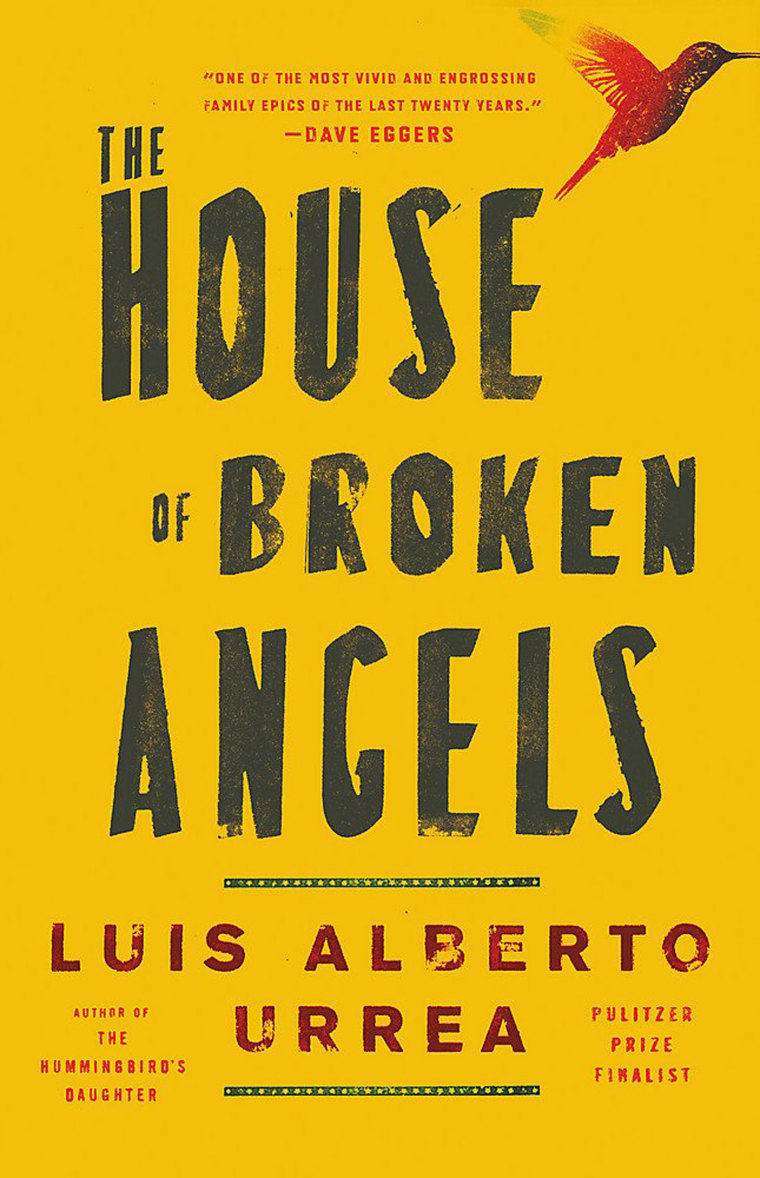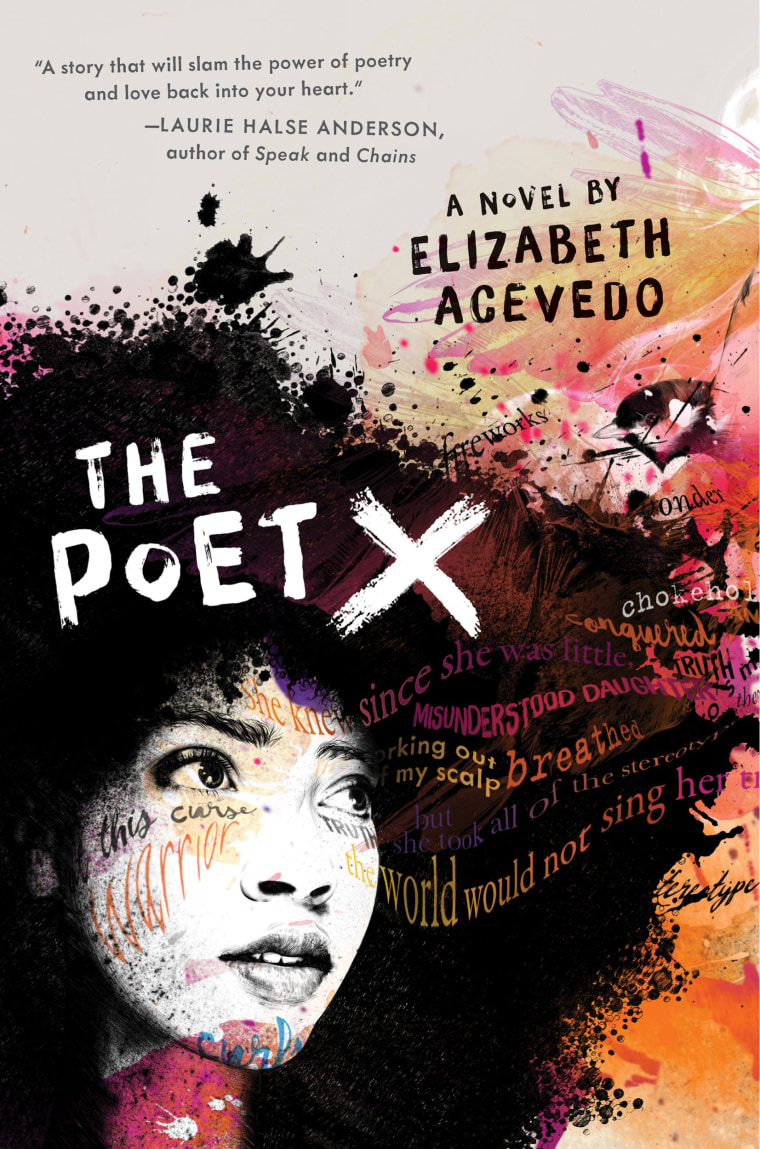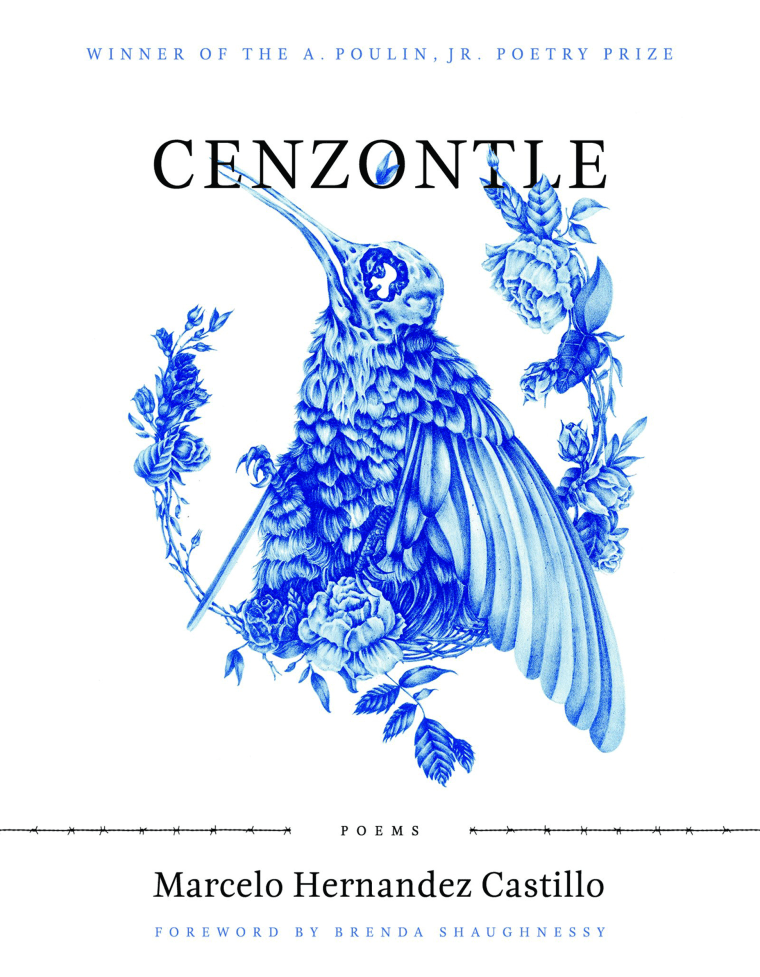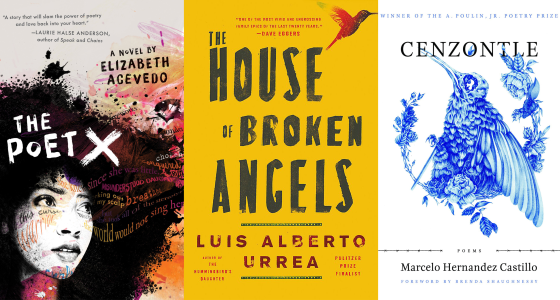Looking for a summer book? Three great reads by Latino authors transport us to a fateful — and wild — family reunion, the travails of a feisty Dominican teen and the undocumented experience through lyrical poetry.
Beloved Chicano writer Luis Alberto Urrea, author of the bestselling novel The Hummingbird’s Daughter (2005) and the award-winning nonfiction book The Devil’s Highway (2004), returns to his favored territory, the Tijuana-San Diego border, with The House of Broken Angels, where he shakes the branches of an already chaotic family tree. The novel zeroes in on a fateful two-day reunion that stirs the de la Cruzes into a whirlwind of emotions until finally everything comes to an arresting halt.
The Dominican American poet Elizabeth Acevedo marks her debut as a novelist with the novel in verse The Poet X, an inspiring story about a budding performance poet, Xiomara Batista, a young Afro Latina who is experiencing a difficult transition into early adulthood. Not only is her developing body disrupting the safety and innocence she once enjoyed as a girl, but she must also contend with her mother’s religious convictions, which threaten to stifle Xiomara’s search for personal expression.
Finally, Marcelo Hernández Castillo, a nationally recognized activist and advocate for the rights of undocumented writers, dazzles lovers of poetry with his debut collection Cenzontle, winner of the A. Poulin, Jr. Poetry Prize. The book adopts a lyrical and haunting voice to communicate the experience of living in the shadows of an adopted country while suffering the pangs of homesickness.
1) Luis Alberto Urrea, The House of Broken Angels (Little, Brown)

Confined to a wheelchair, Big Angel is turning 70, and he is determined to have his celebration even if it’s the day after his beloved mother’s funeral. It’s not a lack of tact that informs this decision but that fact that it was going to be “his last birthday, but nobody knew it. He was collecting his scattered family by decree. It was going to be a puro party that nobody would forget.”
About to succumb to cancer, Big Angel suddenly sees the world with a clarity that most of his family members have yet to achieve. It’s a hard-earned wisdom, after a lifetime of economic and personal struggles. He finally understands that if he didn’t cause the various rifts in the family, then he was somehow complicit.
The traumas in the de la Cruz clan run deep. There’s Yndio, Big Angel’s oldest stepson, who self-identifies as a “non-cisgendered, non-heteronormative cultural liberation warrior.” A muscled Cher impersonator, they may or may not have been responsible for their grandfather’s death after a daring drag performance for the sake of shocking the family. But Yndio’s not the only pariah: there’s also Little Angel, the blue-eyed love child of said grandfather. Little Angel has spent too much emotional energy trying to fit into a family that doesn’t even think to include him in the family pictures.
But most compelling of all are the ghosts that still inhabit the de la Cruz households: Papa Antonio, the original Angel and flawed former patriarch; Guillermo, Big Angel’s nephew by marriage, son of La Gloriosa, an aging beauty enshrouded in grief; and Braulio, Big Angel’s youngest stepson, a war veteran slain along with Guillermo in a gang street fight.
If the adage holds true that “in the desert, families were the water,” then Big Angel is determined to save his bloodline from thirst.
Otherwise, they’ll lose themselves “shaking their heads over one another’s minor atrocities. Gathering in clandestine kitchen meetings to scissor their victims in absentia. Their victims were as tattered as abused coats when they were done. Allegiances shifted like the seasons. Rhetorical weapons ever at the ready.”
A funeral followed by a birthday party may seem unconventional, but this family’s troubles merit such a desperate measure. The bad blood left boiling after Braulio’s killing becomes the unexpected catalyst of Big Angel’s redemption (and Yndio’s and even La Gloriosa’s) as he seeks to piece together “all that is broken” before he runs out of time.
Urrea, a masterful novelist, navigates multiple points of view within a time span of approximately two days (with a brief interlude in the middle of the book in order to include some family history) and manages to present a startling portrait of a multi-generational “post-immigration family” on the U.S.-Mexico border.
Alien status is an important concern and Urrea depicts an honest rendering of how citizenship, like gender, class and colorism, creates tensions between family members. The author also doesn’t shy away from critiquing the military’s recruitment methods, pointing out through the story of Braulio and Lalo, Big Angel’s biological son, how “lots of homeboys fell for it, and later they were all squatting in veteran bunkers in Tijuana, wondering how they got kicked out of the country.”
But Urrea’s borderlands are also a place of imagination and love. The affection that Big Angel has for his wife Perla and their daughter Minnie adds an important dimension to this cantankerous septuagenarian who has had to harden his heart over the years in order to survive the border, first as an undocumented alien and then as a conservative American citizen.
But it’s the neighbor’s son Ookie, a young man with a developmental condition, who becomes the critical messenger. A formidable Lego thief, Ookie’s artistic creation under Big Angel’s mentorship communicates best of all the ultimate lesson: “to realize, at the end, that every minute was worth fighting for with every ounce of blood and fire.”
About to succumb to cancer, Big Angel suddenly sees the world with a clarity that most of his family members have yet to achieve. It’s a hard-earned wisdom, after a lifetime of economic and personal struggles.
The House of Broken Angels is full of surprising characterizations and humorous moments and encounters (Big Angel’s dad jokes notwithstanding), though most of the activity takes place inside people’s minds as they think their way in and out of conflict.
Urrea never lets the energy of his prose sag—it’s impossible with such a motley and yet endearing crew of misfits that will remind readers of the eccentrics in their own homes. Admired for his epic narratives inspired by the life and times of the Saint of Cabora, Urrea now offers this remarkable contemporary novel: an expansive landscape of unforgettable personalities squeezed into a single household in order to pay tribute to the immigrant pioneers and memory-keepers of the 20th century American family story.
2) Elizabeth Acevedo, The Poet X (HarperTeen)

The heat is high in Harlem and fifteen-year-old Xiomara is having a rough end of summer. With a young woman’s body she has become “unhide-able,” subject to catcalls on the street and at school, which only makes her angry. But so too has she grown into her name, which means, “One who is ready for war.”
This must be quite the disappointment for her Dominican parents, who “probably wanted a girl who would sit in the pews/ wearing pretty floral dresses and a soft smile./ They got combat boots and a mouth silent/ until it’s sharp as an island machete.”
Xiomara can’t help it.
Worse yet, she’s about to enter her sophomore year of high school with a spiritual crisis: Mami wants her to comply with the next holy sacrament at church, confirmation, but Xiomara’s not sure she’s ready. She’s got too many questions and not enough answers about the world, the Bible, and the flesh, knowledge she didn’t quite get living under “Mami’s Rikers Islands Prison-like rules.”
Her only confidant is her friend Caridad and sometimes her twin brother Xavier, whom she simply calls Twin. Her only outlet is her notebook, where she “makes poems form the sharp feelings inside,/ that feel like they could/ carve me wide/ open.”
When school starts, fresh opportunities come her way: there’s this Spoken Word Poetry Club led by Ms. Galiano, who seems to have an inkling of Xiomara’s talent and need for expression. But the timing conflicts with confirmation class. And then there’s Aman, a boy from Trinidad, who becomes Xiomara’s lab partner in biology class. She’s immediately smitten, further complicating her relationship with her mother, who warns her to stay away from boys: “There be no clean in man’s hands.”
But besides stirring Xiomara’s desires, Aman introduces her to the power of music lyrics and even gives her a new name, X, which she embraces: “How it’s such a small letter/ but still fits all of me.” She continues a clandestine relationship with Aman until they’re caught kissing on the subway train.
Having broken one of Mami’s testaments (“Make your heart a Brillo pad,// brittle and steel—don’t be no damn sponge.”), Xiomara sets out on a secret mission to take her life back by skipping out on confirmation class and attending the Spoken Word Poetry Club.
And after a fateful performance at the legendary Nutorican Poets Café, there’s no turning back: “Because so many of the poems tonight/ felt a little like our own stories./ Like we saw and were seen./ And how crazy would it be/ if I did that for someone else?”
But Xiomara still has to make peace with Mami before she can fully participate in a public forum with language and ideas that seem out of synch with her mother’s religious convictions.
Acevedo’s complex characterization of Xiomara as a young woman with a “sancocho (stew) of emotions” is the key to the popularity of this novel in verse. The Poet X will keep herself in check in some situations and unleash in others, particularly when it comes to protecting Twin, who is burdened with a personal secret of his own. S
X is extremely cautious some days and impulsive in others, but she remains true to her love of creativity and committed to finding her own way through adolescence, even if it means pushing back on her mother’s wishes. Acevedo treats Xiomara’s questioning of religion with sensitivity, and paves the way convincingly for the compromise that will eventually appease both mother and daughter.
Her only outlet is her notebook, where she 'makes poems form the sharp feelings inside,/ that feel like they could/ carve me wide/ open.'
The novel in verse structure is perfect for this story since each poem is like a reflection that poses a question, concern, or complaint that preoccupies the mind of this young woman in distress. But these are punctuated by moments of discovery, happiness, and personal triumph. Xiomara’s voice rings true in every page, and the reader traces her growth in confidence and self-esteem as she makes her journey to the performance poetry stage.
The Poet X is a heartwarming novel that showcases the rich interiority of a young Afro Latina who wants to find her own agency as she comes of age. It’s a book about how maturity and strength also comes from making mistakes and taking wrong turns. And on the shelves of American letters, where there’s a dearth of stories by Latinas about Latinas, The Poet X is most definitely—in the words of Xiomara Batista—“a lantern glowing in the dark.”
3) Marcelo Hernandez Castillo, Cenzontle (Boa Editions, Ltd.)

In English, cenzontle means mockingbird, the bird that’s known for mimicking the sounds of other birds and sometimes of insects and amphibians. The wider the mockingbird’s repertoire, the more chances it has of attracting a mate. It’s an unusual and yet compelling act of survival. For Hernandez Castillo, the cenzontle serves a more mythic purpose—it becomes the symbol, or in the context of Amerindian mythology, a nahual, an animal spirit that best represents the experience of the undocumented immigrant who must adapt to new landscapes and languages on the U.S.-Mexico border and in the North. This being is simultaneously courageous and vulnerable during the entirety of their journey: “Can you wash me without my body/ falling apart in your hands?”
Existing in relative invisibility is taxing, particularly for the young speaker who hungers to be seen: “Sometimes I want to climb down a tree in secret./ I want to stand in front of a crowd/ and whisper a speech in secret.”
This yearning is reflected in the two poems that fantasize about an “immigration interview” before a televised audience, one before Don Francisco and one before Jay Leno. Such fantasies are short-lived, however, when the speaker eventually acknowledges the implausibility of his longing: “Perhaps the butterflies are mute because/ no one would believe their terrible stories.”
This doesn’t mean resignation, however, it fuels a fire within this speaker to “return all the children/ hidden behind the streetlamps.” One way to step out of the dark is to bear witness.
For this speaker, there is joy in preserving the values he admired in his own family, and in finally being able to tell his story as an act of resistance against invisibility...
Hernández Castillo casts light on the plight of the Mexican farm worker who works long hours in the field (“so little/ that needs to be translated out here”). Labor is expressed as another kind of grief, as workers wear their bodies down so far from home.
And yet, the poet’s lyrical language offers brief moments of respite: “In the field of onions/ Amá’s eyes have blossomed”; “Even moving my hands to sort/ the peppers is a kind of running.”
The speaker’s relationship with the father is particularly poignant. Though he can be gentle and even magical (“he, the only tunnel of song for miles in any direction”), he can also be brutal, teaching his son the hard lessons with a belt named Daisy.
The speaker observes, “Your name is another word for fire.” When cancer afflicts the father, the speaker points out a devastating statistic that “roughly 20,000 farm workers are poisoned every year from pesticides,” and this only accounts for reported incidents.
The goal of the poem, however, as with the entire book, is to move beyond the numbers or headlines and into the personal narratives that humanize the immigrant story. And when a flock of birds crawled out of the father’s mouth and “pointed their beaks/ at the same time/ toward the quiet,” it’s impossible for the reader not to gasp at the devastating beauty of the image.
As for the speaker himself, he finds restoration in a romantic relationship and in the promise of parenthood. This is not a fairytale ending, however, since love for an undocumented immigrant continues to be fraught with anxieties and uncertainties. That’s why there is triumph in achieving something close to happiness, despite adversity and hostile government policies.
For this speaker, there is joy in preserving the values he admired in his own family, and in finally being able to tell his story as an act of resistance against invisibility: “Let this be the last time/ a boy like me cuts himself open,// trying to find the swans/ flapping their wings inside him.// Let this be the last time they appear,/ unfolding their large wings in his chest.”
Cenzontle is a book that speaks with striking language about an experience that’s being presented in public discourse in mostly vulgar terms. Hernandez Castillo’s lyrical voice, gentle yet noticeably audible, stands apart from the noise, singing its sorrows and victories as it soars. An extraordinary debut.




